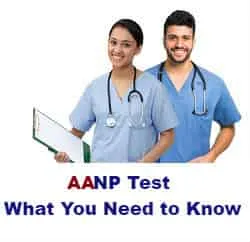AANP Test - What You Need to Know
June-04-2018

American Academy of Nurse Practitioners (AANP) Exams
The American Academy of Nurse Practitioners (AANP) test is an exam that must be taken by entry-level nurse practitioners to become board certified through the AANP. Although licensing requirements may vary from state to state, most nurse practitioners take this exam to recognize their knowledge, education and professional expertise in the area of nursing. Here are some things aspiring nurse practitioners need to know about this test.
How to Prepare for the AANP Test
To be eligible to take the AANP test, candidates must be registered nurses who have completed accredited nurse practitioner training programs, which are typically graduate, post-graduate or doctoral degree programs. They must also have completed a designated number of clinical hours working as nurse practitioners.
The cost of the AANP exam can vary. If the candidate is a member of an organization such as the AANP, the exam is about $240. If not a member of a professional organization, the cost is around $315.
Students planning to take the AANP test are advised to begin studying at least six months before they take the test because of the difficulty of the exam. They can also purchase a practice exam through the AANP or the ANCC (American Nurses Credentialing Center). The practice exam gives students a general idea of what they can expect on the actual exam. It also gives them ideas of what areas they're knowledgeable and where they need extra help and study. There are several AANP practice exams that are available for purchase for students.
Before taking that actual test, the candidate should try to find out any requirements and rules that may apply to the test. For instance, where is the testing site? What is required as far as proof of identification?
What's on the AANP Test?
The AANP test takes approximately three hours to complete and consists of 150 multiple-choice questions. Students typically have about 50 seconds in which to answer each question. The AANP test is broken down into the following areas.
Assessment - This makes up about 36 percent of the test and involves using patient information such as history of illness, chief complaints and relevant medical history to obtain objective information needed to determine health needs.
Diagnosis - This makes up 24 percent of the test and involves formulating and establishing definitive diagnoses.
Plan - This makes up 24 percent of the test and involves how to establish a cost-effective, age-appropriate and individualized plan of treatment to best address the diagnoses.
Evaluation - This makes up 17 percent of the test and involves determining the treatment plan's effectiveness and making any appropriate modifications.

Pass or Fail?
The average pass rate for the AANP exam in 2015 was about 81.4 percent. Students who fail the AANP exam must complete at least 15 hours of continuing education credits in the areas of weakness identified by the test score results. The AANP website offers a question bank which helps students study for the retake exam while also helping them fulfill continuing education requirements.
Areas of Specialization
When practicing for whatever standardized certification exam you're slated to take, calculate how much time per question per section you're allotted.
Students interested in certain areas of nurse practitioner care can take certification areas in those specific areas. These may include the following
Blogs related to: AANP Test - What You Need to Know



Becoming a Family Nurse Practitioner (FNP) is a challenging yet rewarding career path. It requires advanced education, extensive clinical experience, and successful completion of a certification exam. There are two nationally recognized organizations that offer certification exams for FNPs: the American Nurses Credentialing Center (ANCC) and the American Association of Nurse Practitioners (AANP). In this blog, we will discuss the differences between these two exams, which certification is most looked for in the industry, and the best way to prepare for the exam.







